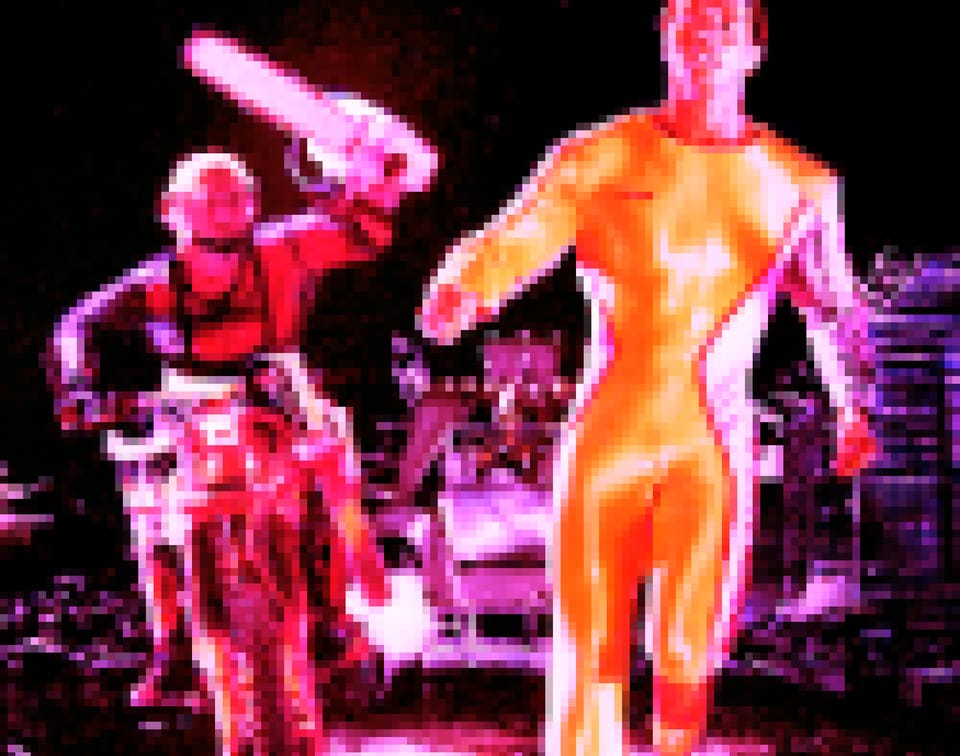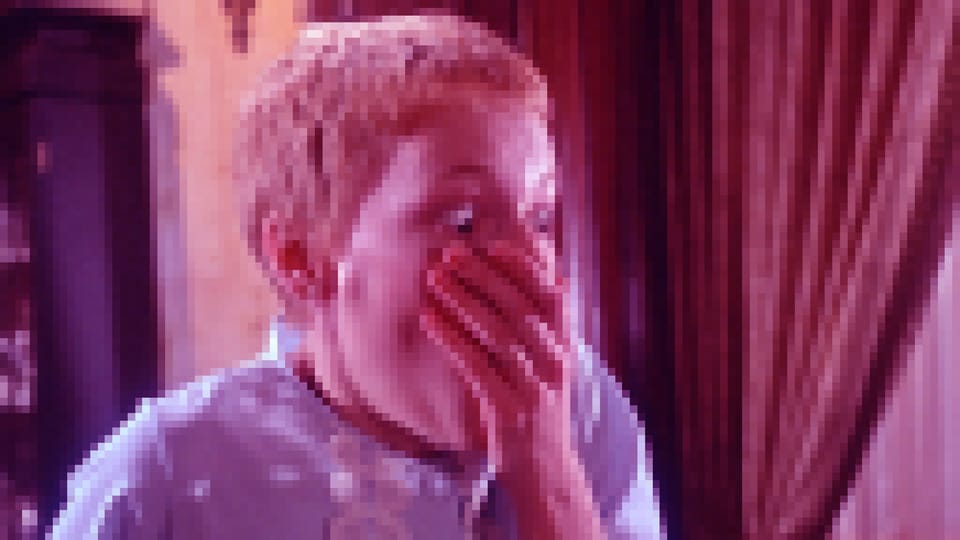The Mechanics of Total Recall

Spoilers for both Total Recall and We Can Remember It For You Wholesale ...
It is safe to say the movie Total Recall (1990) is not hard science fiction. It is a movie that doesn’t take the genre too seriously, and that is precisely what I love about it: If you’re not going to adhere to strict scientific feasibility, why bother aiming too hard for any kind of feasibility? Why not create something instead that is enjoyable and full of engaging ideas?
There’s nothing new in that work ethic when Hollywood, or any film industry, is concerned. The real, the factual and the possible are not always welcome in fiction. The trick, I guess, is to make it look intentional; that is, to make it clear to the audience you don’t care if some of the ideas are ridiculous as long as they’re fun.
But in the case of Total Recall, there exists within the structure of the story a perfect workaround that allows the film to be filled with – ahem – eye-popping moments.
Science Failure
So there are a number of things you can criticise in this film. Off the top of my head there’s the ridiculously large ball containing a tracking device, shoved up Quaid’s nose; there’s the fact that the glass dome on Mars that contains a breathable atmosphere is vulnerable to gunshots, and accessible to the public; there’s Jonny Cabs, robot cars that have a robot driver rather than the car itself being the robot; there’s the entire planet of Mars getting a breathable atmosphere in about five minutes; and so on …
But none of this matters, because Total Recall is a movie whose gimmicky technology works perfectly to jokingly dig at capitalism. What matter does it make if your battery-powered Jonny cab explodes after a minor collision? We’ve got psychic mutants and drilling machines that drive out into traffic; we’ve got artificial heads for masking our true identity and they also explode!
Verhoeven’s Ambiguity
As much as I enjoy Verhoeven’s films, they do have a certain ambiguity that dilutes any message they may or may not have. Starship Troopers is perhaps the best example of this. It is a movie full of fascism, fascist propaganda, and jingoism, yet it follows the story of a military victory for a fascist army in a fascist regime. It’s like Verhoeven takes an action movie, but without altering the story or the final message, inserts fascist imagery throughout, so there’s no clear message, and one cannot say for sure the message is truly an anti-fascist one. It’s a weak, unfocused message, albeit an enjoyable film.
In Total Recall there is not so much of an ambiguity. Perhaps because the fascists in the story are actually the bad guys, and perhaps because the central theme of shop-bought memory implants is enough of a critique of capitalism for Verhoeven to work with. There was enough in the story about clunky technology and the sex industry to keep Verhoeven happy, I think, and many of these elements were already written in, coming direct from Philip K Dick’s original short story, with a clear good or bad reading.
The other reason there isn’t a problem with ambiguity is that the story has two readings, one of which is, ‘It’s all a dream’. This means any criticisms can be written off as dream logic. The film being one long delusion is the correct reading, but I personally like to think everything that happens happens in the story for real, especially since that’s what the movie wants the viewer to want. I don’t mind the more depressing cold reality of Quaid losing his mind, but believing in the fantasy world is a much more satisfying reading, and movie thinks so too.
The movie insists the viewer stays within the fantasy, because that’s where all the fun is.
The World
One thing I love about Total Recall is the almost sterility of the streets. There is something cold about the architecture – some of which is a brutalist army barracks in Mexico. The brutalism works well with the world created: somehow futuristic in its boxy design, yet crummy and depressing. It’s a believable world of drudgery and shopping. And that’s one of the features I like the best: it’s a believable, slightly hysterical world of capitalist drudgery.
It’s the kind of world Philip K Dick was particularly good at, and what the movie takes from the original short story. It’s nice how the narrative is tied to such pedestrian things like going to work and travelling on public transport. While science fiction about everyday living is probably nothing new, Total Recall does it so very well. Perhaps it took it some of its aesthetic from Bladerunner, but Total Recall is a little less Noir than Bladerunner. So we have the drudgery of a Philip K Dick world, but Total Recall also preserves a lot of the humour and crappiness in Dick’s writing, making it perhaps a more accurate depiction of Dick’s world.
Memory implants are basically ‘holidays for poor people’, and it’s the sort of thing unrestrained capitalism excels at. The man at the Rekall centre is like a used car salesman. Perhaps this is a little bit on-the-nose, but it’s a good performance anyway. The technicians are trained, yet have a certain bored-of-their-job air about them. Customer satisfaction is something that only matters to maintain a good company image and to not get into any legal issues. The workers themselves don’t really seem to give a shit about customer satisfaction.
It works so well with Verhoeven’s cynicism because Dick also shared this cynicism. Or perhaps it’s not cynicism; perhaps it’s just a particular sense of humour about how ridiculous our world is.
It’s all a Dream …
There are parts of the story logic that are certainly questionable. Like when the man at the phone box calls Quaid from the street. How did he find him? But these seeming plot holes don’t really hinder the narrative, perhaps because the movie is constantly posing the question, Is this a dream?
So the plot holes don’t bother me. They appear, add mystery, then the narrative moves on and we’re thinking about something else. It just doesn’t matter. If you sat down and thought hard about the storyline, I’m sure there are plenty of grey areas that don’t quite add up. But dream logic allows for this.
The part where the man from the Rekall advert visits Quaid is an interesting scene. First there is the question of how he managed to find Quaid, the second is how the armed troops are able to burst so easily through solid walls. The director’s commentary confirms this is all dream logic. As soon as Quaid shoots the Rekall man, his mind goes back into fantasy and the troops burst through the walls.
It is a great scene which includes Quaid’s wife, who enters saying she isn’t there in the fantasy with him, but she’s with him in the real world, at the Rekall centre. Sharon Stone is great in this movie and everything she does is to say she is devious and untrustworthy. Yet, her untrustworthiness is just a manifestation of Quaid’s paranoia.
Everything about this scene is geared towards keeping not just Quaid, but the viewer inside the fantasy, despite the fact the Rekall man lists off all the fantasy options Quaid chose at the Rekall centre, and goes on to explain what the future of the movie is going to be. Despite the true reading being that it is all a delusional fantasy, the movie wants you to keep the fantasy alive.
The bead of sweat that is the death sentence for the Rekall man isn’t just telling Quaid to stay in the fantasy, it’s telling us the viewer too. The movie wants you to agree that Quaid is making the correct judgement. The reality part … isn’t where the action is.
We Can Remember It For You
The movie embellishes Philip K Dick’s short story We Can Remember It For You Wholesale, yet a lot of the elements in the film are in the novel. Interestingly, while the movie plays on the is-it-or-isn’t-it-a-dream? theme, the book kind of does it in reverse. When Quail (as he is named in the book) goes to Rekall, he choses a secret agent theme. The story tells us the fake implant isn’t put in, and, like the film, Quail suddenly finds himself in a secret agent storyline. However, Quail destroys the idea of it being a delusion by providing actual evidence he went to Mars. Although the proof could be part of the delusion, Dick doesn’t really imply that. There’s no sense that the entire story is supposed to be read as dream like it is in the film. Then later when they try to fix his memory, the Rekall people unearth a fantasy about aliens. Quail then tells them, in his sedated state, he owns evidence that this also really happened, again more or less proving the fake memory is actually true.
So the short story seems to be more about taking fake ideas and surprising the reader by making them real, rather than telling a story and including elements that suggest it’s not real. An element of paranoia is also brought in though a brain implant that allows the secret agents to read Quail’s thoughts. The mind-reading implant isn’t really a feature of the film although there are paranoia-inducing parts where other characters unexplainedly know what Quaid has done. The movie instead turns the implant into a good old tracking device, and makes sure this is removed as soon as possible so the narrative can continue.
In the book the implant isn’t removed, which helps to contain the narrative into a short story format: it holds Quail back and forces him to surrender.
Double-double Cross
The book doesn’t quite explain why the Interplan people have kept Quail alive. It sort of mentions that he’s too badass to kill, and by the end there’s an important reason why he shouldn’t die, but this reason isn’t known to the Interplan people until the end. The idea you’d wipe someone’s memory instead of just killing them is a bit weak. (I suppose that weakness points to it all being a dream again!)
The movie however, injects some originality into this idea by making the entire thing a subterfuge to crush the rebellion. It turns out Quaid is actually Hauser and is both a bad guy and an asshole, and again, the movie compels the viewer to embrace fantasy over reality. What I love about this film is how Quaid decides, yes, he actually wants to be Quaid. This story device adds another level of questionableness to what the truth is, yet it goes with: You know what? I want to be the fake identity guy, not my true self who’s a fascist!
It’s an interesting idea of identity, and everything about the story makes you want Quaid to stay as Quaid. And I love how it doesn’t go into a deep introspective despair as Quaid tries to work out who is the real him. No, he just choses the more likeable person and goes with that, and as the viewer, we too choose the more likeable person, and we’re cool with that.
Fade to White
I’ve never been a big fan of dreams within dreams and ‘Actually, none of this actually happened!’ stories. I find those concepts a little dreary and not as deep and thought provoking as some may feel they are. The problem with including a questionable reality in your fiction is: Where does it end? It does get boring.
Total Recall however, does everything to keep the fantasy alive, and although it openly tells the viewer all the way through that it could all a delusion, it doesn’t go deep into that question. It allows the viewer to read the story either way, and I would argue that the correct way to read the film is the fake way. Yes, it’s a delusion, but that’s what we want.
Over and out for now, guys!
xxx




